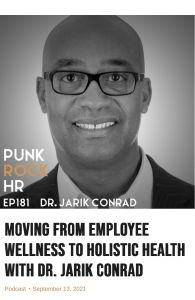
Recommendation
Looking after people’s well-being has become an important part of the HR function, especially since the start of the COVID-19 pandemic. But true well-being doesn’t just mean the absence of a diagnosable condition or illness. Dr. Jarik Conrad, VP of Human Insights at the HR platform UKG, argues that HR departments must play a proactive role in looking after the mental and emotional health of employees, which he sees as the foundation of any well-being initiative. He shares valuable insights about the pandemic and the expanded role of HR departments in an episode of the Punk Rock HR podcast.
Summary
About the Podcast
Dr. Jarik Conrad is VP of Human Insights at the HR platform UKG (Ultimate Kronos Group). Punk Rock HR is a podcast hosted by the author and leadership consultant Laurie Ruettimann.













Comment on this summary